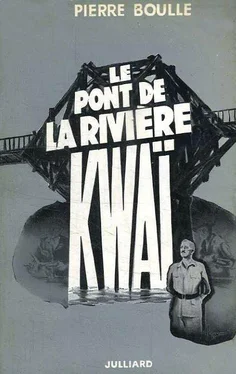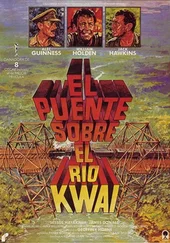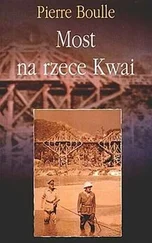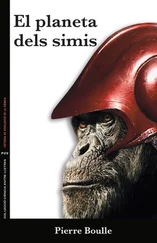The time passed desperately slowly, at a snail’s pace, as sluggishly as the diminished flow of the River Kwai; it was measured for him in endless seconds by the muffled murmur of the water nibbling imperceptibly into a future fraught with danger, storing up in the past a few flashes of security, each invaluable but infinitesimal and tragically out of proportion with his anxiety. The tropical light flooded the dripping valley and shimmered on the wet black sand of the recently exposed river bed. After outlining the crossbeams in the superstructure of the bridge, the sun, hidden for a moment by the platform, rose above this obstruction, casting before it the gigantic shadow of this example of human artifice. It crossed the pebble beach in a straight line parallel to the wire, was distorted in the water where it writhed in countless curves, then melted away on the other side into the shape of the hills beyond. The heat hardened the cuts on his tattered hands and made the wounds on his body smart horribly in the grip of multicolored legions of ants. But physical pain did not distract his thoughts; it was only an agonizing accompaniment to the obsession which had been racking his brain for the last few minutes.
A fresh fear had assailed him just as he was trying to imagine what form the action would have to take if, during the next few hours, his fate-line were to be crossed by one particular event—a Japanese soldier wandering idly along the river and stopping to investigate the pebble beach. He would be surprised to see the wire. He would stop. He would bend down to take hold of it and stand still for a moment. It was then that he, Joyce, would have to intervene. It was essential for him to visualize his own actions in advance. As Shears had said, he brooded too much!
Picturing this action was enough to tie his nerves in knots and paralyze every muscle. He could not help it. He had a deep instinctive feeling that this action was imperative, that it had been ordained a long time ago, that it was the natural conclusion of events leading inevitably to this final test of his capabilities. It was the most dreaded, hateful test of all, which he could throw onto one or the other side of the scales, a test sufficiently fraught with horror and sacrifice by itself to tip the scales on the side of success by snatching him from the hungry grasp of destiny.
He exercised all his brain cells with this final end in view, feverishly going over in his mind the school instructions, trying to devote himself body and soul to the dynamics of the job on hand, yet still unable to banish the nightmare of the immediate consequences.
He remembered the worrying question which his C.O. had once asked him: “When the time comes, would you be ‘capable,’ in cold blood, of using this weapon?” He had been uneasy about his instinctive reactions and will power. At the moment of launching out on the river he had been absolutely certain; now he was not sure of anything. He looked at the weapon lying on the grass beside him.
It was a sharp, long-bladed knife with a short metal hilt just big enough to ensure a reasonable grip, blade and hilt being all in one piece. The back-room boys of Force 316 had modified its blade and handle several times. The instructions in its use had been specific. It was not simply a question of clenching one’s fist around it and striking blindly; that was too easy—anyone could do that. Every form of destruction requires its own individual technique. The instructors had taught him two methods of using it. For purposes of defense, against a man rushing forward, it was advisable to hold it in front of one, with the point tilted slightly upward and the cutting edge uppermost, and to strike with an upward thrust as though disemboweling an animal. The gesture itself was not beyond his powers. He could have done it almost automatically. But in this case he would not have to. There would be no enemy rushing forward. He would not have to defend himself. For the action which he was anticipating, he would have to use the second method. It needed hardly any strength, but a lot of skill and utter ruthlessness. It was the method by which the trainees were taught to wipe out a sentry in the dark without giving him the time or opportunity to raise the alarm. It necessitated striking from behind; but not in the man’s back (that, too, would have been too easy). It necessitated cutting his throat.
The knife had to be held palm downward, with the nails underneath, the thumb running along the back of the blade to ensure proper control; with the blade itself held horizontal and perpendicular to the victim’s body. The thrust had to be made from right to left, firmly, but not violently enough to turn it off its course, and directed at a certain point an inch or two below the ear. This point, and no other, had to be aimed at and hit to prevent the man from crying out. Such was the general plan of the operation. It also involved several further subsidiary gestures, secondary but no less important, which had to be carried out immediately after the blade’s penetration. But the advice on this subject, which the Calcutta instructors gave so light-heartedly, Joyce did not even dare whisper to himself.
He could not dispel his mental picture of the immediate consequences. So he forced himself instead to examine it closely, to build it up in his mind in every detail of its shape and horrid aspects, in the mad hope that he would thereby get used to it and so reach that state of detachment which is born of habit. He relived the scene a dozen times, twenty times over, and gradually managed to create not a ghost, nor even a vague imaginary shadow, but a human being, a real flesh-and-blood Japanese soldier standing on the beach in uniform, wearing his funny cap, his ear projecting underneath it, and, a little lower down, the small patch of brown skin which he aimed at as he silently lifted his outstretched arm. He forced himself to feel, to judge the resistance to the blow, to see the blood spurting and the body jerking as the knife in the palm of his clenched fist went through the subsidiary gestures and his left arm flashed down and bared the victim’s throat. He steeped himself for hour after hour in the worst horror he could imagine. He made such an effort to train his body to be nothing more than an insensible obedient machine that he felt overwhelming fatigue in every muscle.
He was still not sure of himself. He was appalled to see that this method of preparing himself was not effective. The threat of failure taunted him as relentlessly as the realization of his duty. He had to choose between two courses: the first ignominiously scattering, in an eternity of shame and remorse, the same horror that the second concentrated in a few seconds of ghastly action —an ignominious but passive course, demanding only inactive cowardice and so all the more attractive for providing the insidious temptation of the easy way out. He came to realize that in cold blood and in full possession of his faculties he would never be capable of the action which he insisted on picturing to himself. He felt, on the contrary, that he would have to banish it from his mind and find either a stimulating or sobering alternative » which would turn his thoughts elsewhere. He needed more help than he could derive from the paralyzing contemplation of this terrifying task, i Outside help? He looked around him in despair. He was alone and naked in a strange land, skulking in the - undergrowth like a wild beast, surrounded by enemies of , every kind. His only weapon was this dreadful dagger burning a hole in the palm of his hand. He searched in | vain for some support from any feature in the landscape which had fired his imagination. Everything now looked hostile in the Kwai valley. The shadow of the bridge was now nothing but a lifeless, useless structure. There was no hope of help. He had nothing more to drink, nothing to eat. It might have been comforting to gulp down some sort of food, any sort.
Читать дальше











